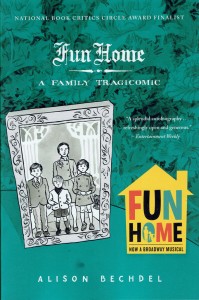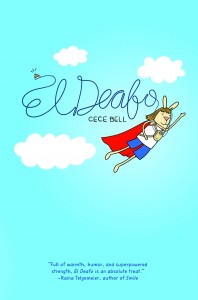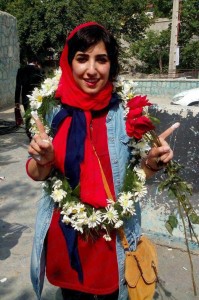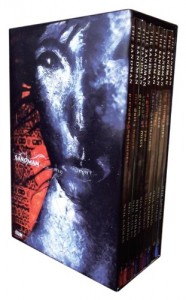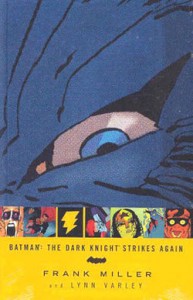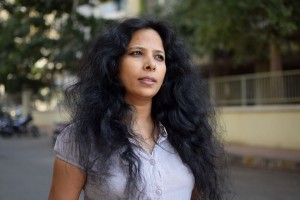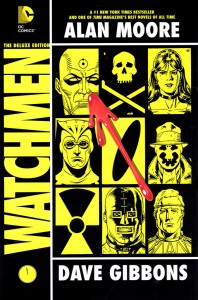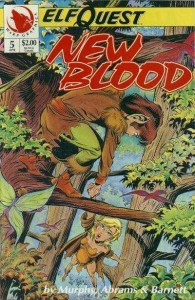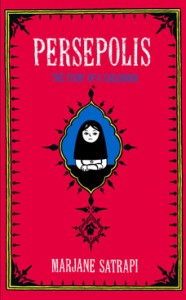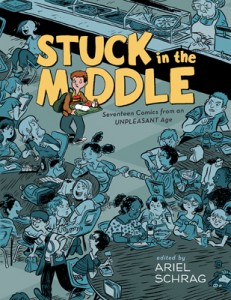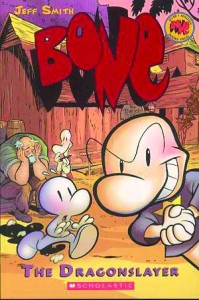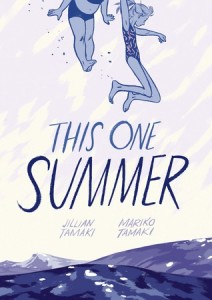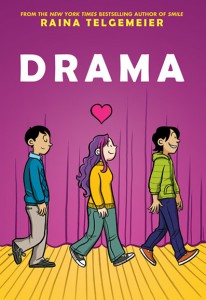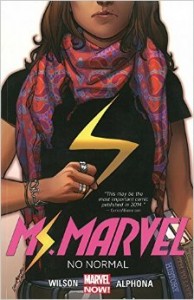In recognition of Banned Books Week, we’ve gathered some quotes about censorship from comics creators around the world, including Neil Gaiman, Raina Telgemeier, Alison Bechdel, and more!
Click on the links below to download posters and shelftalkers featuring these quotes!
- CBLDF Banned Books Week 2017 Shelftalker Spread (11″ by 17″)
- CBLDF Banned Books Week 2017 Shelftalker Spread (11″ by 17″ with bleed)
- CBLDF Banned Books Week 2016 Shelftalker Spread (11″ by 17″)
- CBLDF Banned Books Week 2016 Shelftalker Blurbs
Alison Bechdel
“My first reaction [to being banned] is: What a great honor! My second reaction is, it’s a very interesting situation, and it’s all about the power of images, which I think is something people need to talk about. I can understand why people wouldn’t want their children to accidentally think this was a funny comic book and pick it up and see pictures of people having sex. I can understand that. I think banning books is the wrong approach.” (Source: The Comics Journal)
Alison Bechdel’s acclaimed Fun Home is one of the most frequently challenged graphic novels.
Cece Bell
“When we censor ideas and viewpoints and stories, especially those that come from unique voices, we stifle the imagination. When imagination cannot flourish, neither can the development of an empathetic spirit. We must have imagination in order to have empathy—how else can we picture how it might feel to flee a scary place, or fear a permanent separation from one’s family, or lose a vital sense? Artists must be encouraged to write and speak and draw—freely—so that we may all be free.”
Cece Bell’s El Deafo was the first graphic novel to be shortlisted for the Newbery Medal.
Atena Farghadani
“Some people think that art is not important, but the responsibility of an artist is to challenge authority and to be challenged. Sometimes the price for an artist is imprisonment, but do not forget that artists have
responsibilities.” (Source: My Stealthy Freedom)
Atena Farghadani served 18 months in Iranian prison for drawing a cartoon critical of the country’s legislature.
Neil Gaiman
“I don’t think there is such a thing as a bad book for children. Every now and again it becomes fashionable among some adults to point at a subset of children’s books, a genre, perhaps, or an author, and to declare them bad books, books that children should be stopped from reading. I’ve seen it happen over and over; Enid Blyton was declared a bad author, so was RL Stine, so were dozens of others. Comics have been decried as fostering illiteracy.
“It’s tosh. It’s snobbery and it’s foolishness…
“Well-meaning adults can easily destroy a child’s love of reading: stop them reading what they enjoy, or give them worthy-but-dull books that you like, the 21st-century equivalents of Victorian “improving” literature. You’ll wind up with a generation convinced that reading is uncool and worse, unpleasant.” (Source: The Guardian)
Neil Gaiman is the author of several award-winning novels and comics, including The Sandman, Neverwhere, and The Graveyard Book, all of which have been challenged.
Frank Miller
“Anything that got between my brush and my drawing board was my enemy. Free speech has a long and honorable history in the United States. This is part of it. But as an artist, I can only say: Get the hell out of my way.” (Source: CBLDF)
Frank Miller is the groundbreaking creator of The Dark Knight Returns and Sin City.
Kanika Mishra
“People in power like to have a society which does not ask questions, and whenever anybody does it, they fear that they will lose control. They try to control people in the name of gender, religion, caste, and race, and then censorship comes [into] the picture. I strongly feel that there should be no censorship of any kind… Suppression only leads to violence, hate, and chaos, while freedom leads to love, peace, and harmony.”
Cartoonist Kanika Mishra has been threatened and censored in her native India.
Alan Moore
“If parents are making the decisions that their children can or cannot read this sort of book in the home, that’s fair enough. The parents can take the consequences of that. It won’t necessarily stop the children reading it, but at least it’s a transaction between the child and the parent and it’s the parent taking responsibility for their children… I prefer to let my children read anything, but I want to know what they’re reading, and if there’s anything they come across which might be disturbing, then I’m always on hand to talk about it with them. Which, to me, seems to be the responsible attitude.” (Source: The Comics Journal #118)
Alan Moore’s Watchmen, League of Extraordinary Gentlemen, and Batman: The Killing Joke have drawn the ire of censors.
Wendy Pini
“Throughout the ages, women of all cultures, stations, and stripes have known what it is to be told to shut up. Women have always had to fight to be heard. A great number of them have given their lives to express their truths their way. Now, in our current atavistically sexist political climate, women who work in the comics industry are fortunate to have a platform and a medium that, by and large, seems to welcome subversive content. Ordinary feminine acts that have heretofore been considered taboo (or at least too “icky” for public consumption)—menstruation, giving birth, etc.—are now being acknowledged as acts of power. I take heart that, as millions and millions continue to demonstrate against America’s current, loathsome anti-women’s rights administration, girls will find inspiration and courage in the well-conceived, multi-dimensional female comic characters that we female creators proudly and defiantly put forth.”
Wendy Pini is the co-creator of Elfquest. A depiction of childbirth in the series led to obscenity charges that were dismissed thanks to CBLDF.
Rokudenashiko
“Since I started my work in Manko art, I’ve been fighting back against the old men who complain about it. I’ve decided to keep making even more ridiculous work, with all seriousness. Though this was kind of a joke at first, now I am joking around with every ounce of my body and soul.” (Source: Introduction to English edition of What Is Obscenity)
Mangaka Megumi Igarashi, or Rokudenashiko (good-for-nothing girl), has been convicted of obscenity in Japan for her manko, or pussy, art.
Marjane Satrapi
“The good thing is that these people who ban things, it’s like they are completely unaware of what a human being is. If you want to make adolescents read a book, ban it! And then they all want to read it. Because then they’re rebellious. Why not just explain it? It’s not like kids are dumb.” (Source: American Libraries Magazine)
Marjane Satrapi’s Persepolis is often challenged for the depiction of violence, profanity, and Islam.
Ariel Schrag
“Every parent has the right to monitor his or her child’s reading (or TV watching, or movie watching, etc.), and if you don’t want your child reading Stuck in the Middle, I completely respect that choice. However, there’s a big difference between making that choice for your child and making it for every child, which is what banning the book does.” (Source: CBLDF)
Ariel Schrag’s anthology Stuck in the Middle has been challenged several times due to Schrag’s commitment to authentic stories that accurately reflect the realities of middle school.
Jeff Smith
“I learned… that Bone has been challenged on the basis of “political viewpoint, racism and violence.” I have no idea what book these people read. After fielding these and other charges for a while now, I’m starting to think such outrageous accusations (really, racism?) say more about the people who make them than about the books themselves.” (Source: CBLDF)
Jeff Smith is the creator of Bone, an all-ages comic series that has been targeted by censors.
Mariko Tamaki
“If you pull a book from a library shelf, it’s not available to the kid who gets their books at the
library. So, you’re impacting that library as a resource to the readers who depend on it.” (Source: She Changed Comics)
Mariko and Jillian Tamaki’s This One Summer was the first graphic novel to earn the Caldecott Honor. CBLDF has defended the graphic novel from censorship on several occasions.
Raina Telgemeier
“[The censorship of diverse content] sends a problematic message to readers. Every flavor of young person deserves to see themselves in literature, and the powers-that-be challenging content that isn’t straight–white–cis–conservative tells everyone else that they’re not worthy. The future is bright, though. The storytellers coming of age now have access to such a goldmine of diverse content, and they’re already busy adding their own voices to the mix. I don’t think anyone will be able to stop them.” (Source: She Changed Comics)
Raina Telgemeier’s Drama has been challenged for the depiction of gay characters.
G. Willow Wilson
“Honestly, I don’t know why anybody bothers to try to censor books anymore. Haven’t they learned? Attempting to censor books sends sales through the roof. When you tell people a book is too risqué or dangerous to read, they will go out of their way to read that book, because now it has the appeal of something forbidden. You can’t contain a story once it’s out there.” (Source: She Changed Comics)
G. Willow Wilson writes Ms. Marvel.
Help support CBLDF’s important First Amendment work in 2017 by visiting the Rewards Zone, making a donation, or becoming a member of CBLDF!
